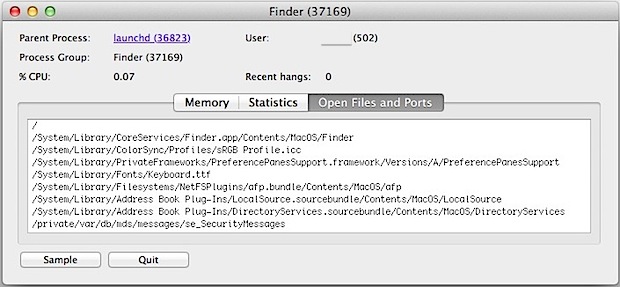
Latest MacPorts release: 2.7.1 Getting involved: Students Other important help resources are our online documentation,Ī.K.A The MacPorts Guide, and our Trac Wiki If you run into any problems installing and/or using MacPorts we also have many options to help you, depending on how
#Mac os list open ports download
Getting startedįor information on installing MacPorts please see the installation section of this site andĮxplore the myriad of download options we provide and our base system requirements. There are thousands of ports in our tree, distributed among different categories, and more are being added on a regular basis. (including macOS Monterey v12 on both Intel and Apple Silicon). “unstable” branches, targeting mainly macOS Mojave v10.14 and later
#Mac os list open ports software
We provide a single software tree that attempts to track the latest release of every software title (port) we distribute, That greatly simplify the task of compiling and installing open-source software on your Mac. To that end we provide the command-line driven MacPorts software package under a 3-Clause BSD License, and through it easy access to thousands of ports

#Mac os list open ports mac
In this example, the 1st line exhibits a connexion from my Mac towardġ7.172.233.109, which a further: whois 17. MacPorts Project is an open-source community initiative to design an easy-to-use system for compiling, installing,Īnd upgrading either command-line, X11 or Aqua based open-source software on the Mac To see both servers listening, and connections already established in both directions. …without any added filtering, so as to get the correct headers, and Tcp4 0 0 localhost.773 localhost.63173 ESTABLISHED Tcp4 0 0 localhost.63173 localhost.773 ESTABLISHED Tcp4 87 0 my_iMac_at_home.63429 .http ESTABLISHED Tcp4 58 0 my_iMac_at_home.63452 .http ESTABLISHED Tcp4 116 0 my_iMac_at_home.55478 .http ESTABLISHED Tcp4 87 0 my_iMac_at_home.55481 .http ESTABLISHED Proto Recv-Q Send-Q Local Address Foreign Address (state) The simplest method is to use netstat: $ netstat -ap tcpĪctive Internet connections (including servers) pid: 71 name: /Applications/Pritunl.app/Contents/Resources/pritunl-service Proto: tcp4 addr.port: *.58640 pid: 320 name: /usr/libexec/rapportd Proto: tcp6 addr.port: *.58640 pid: 320 name: /usr/libexec/rapportd pid: 67931 name: /Applications/electerm.app/Contents/Frameworks/electerm Helper.app/Contents/MacOS/electerm Helper pid: 70043 name: /Applications/IntelliJ IDEA.app/Contents/jdk/Contents/Home/jre/bin/java Proto: tcp4 addr.port: 127.0.2 pid: 70043 name: /Applications/IntelliJ IDEA.app/Contents/jdk/Contents/Home/jre/bin/java Proto: tcp4 addr.port: 127.0.3 pid: 70043 name: /Applications/IntelliJ IDEA.app/Contents/jdk/Contents/Home/jre/bin/java Proto: tcp4 addr.port: 127.0.9 pid: 70065 name: /Applications/IntelliJ IDEA.app/Contents/jdk/Contents/Home/jre/bin/java Proto: tcp46 addr.port: *.61992 pid: 70065 name: /Applications/IntelliJ IDEA.app/Contents/jdk/Contents/Home/jre/bin/java Proto: tcp4 addr.port: *.61993 pid: 70043 name: /Applications/IntelliJ IDEA.app/Contents/MacOS/idea Proto: tcp46 addr.port: *.62085 pid: 70078 name: /Library/Java/JavaVirtualMachines/jdk1.8.0_162.jdk/Contents/Home/bin/java Proto: tcp46 addr.port: *.62070 pid: 70078 name: /Library/Java/JavaVirtualMachines/jdk1.8.0_162.jdk/Contents/Home/bin/java Proto: tcp46 addr.port: *.62087 pid: 70078 name: /Library/Java/JavaVirtualMachines/jdk1.8.0_162.jdk/Contents/Home/bin/java Proto: tcp46 addr.port: *.35729 pid: 70078 name: /Library/Java/JavaVirtualMachines/jdk1.8.0_162.jdk/Contents/Home/bin/java pid: 70078 name: /Library/Java/JavaVirtualMachines/jdk1.8.0_162.jdk/Contents/Home/bin/java It'd be interesting to see other opportunities to make this nicer/slimmer. I have a small collection of these convenience functions in a file that I source from ~/.bash_profile, or ~/.zshrc. So, this is what I quick put together: netstat -Watnlv | grep LISTEN | awk '' | column -t -s "|"

I read other questions/answers offering lsof* and netstat* on MacOS, and I still wanted something with more compact output. First, I'm not a BSD expert, but like the OP I wanted the rough equivalent of running the following on a *nix box, or something close: netstat -tulpn


 0 kommentar(er)
0 kommentar(er)
